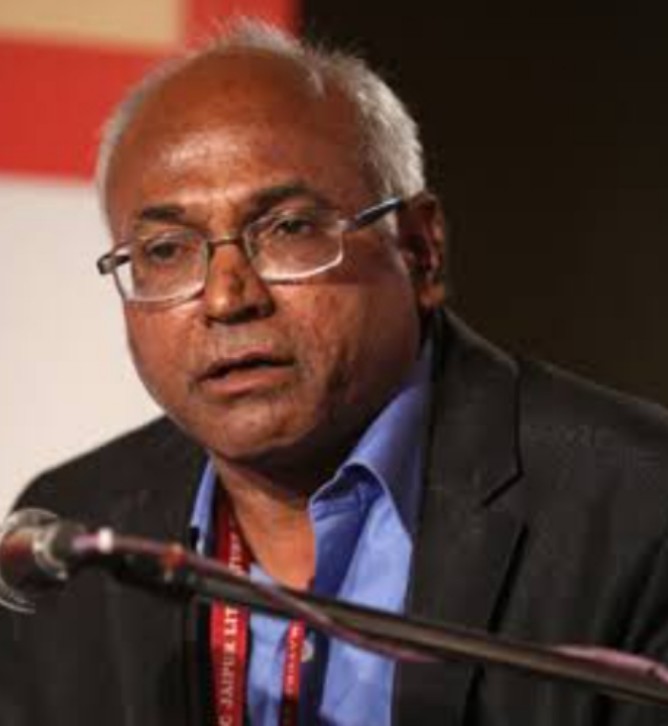
“Professor Kanche Ilaiah: The Revolutionary Thinker Redefining Caste and Equality”
As Professor Kanche Ilaiah Shepherd turns 72, we honor the life and work of one of India’s most radical thinkers, social activists, and scholars. For over four decades, Professor Ilaiah has been a driving force in the struggle for social justice, advocating for the rights and dignity of Dalits, Bahujans, and other marginalized communities. His groundbreaking contributions to Dalit-Bahujan thought and his unyielding commitment to dismantling the oppressive structures of caste have earned him both admiration and controversy.
As a scholar, writer, and activist, Ilaiah has inspired generations to question the deep-rooted inequalities in Indian society. His works have fundamentally reshaped the discourse on caste, religion, and social reform, making him a figure of towering importance in contemporary India.

Early Life: Roots in Marginalization
Kanche Ilaiah was born on October 5, 1952, in the remote village of Papaiahpet in Warangal district, Telangana. His family belonged to the Kuruma shepherd community, an Other Backward Class (OBC) group that historically faced economic deprivation and social marginalization. Born into a world where the caste system dictated one’s life trajectory, Ilaiah’s early experiences deeply influenced his worldview and set him on the path toward becoming a voice for the voiceless.
Education became a critical turning point in his life. Despite the hardships faced by his community, Ilaiah pursued formal education and graduated with a Master’s degree in Political Science from Osmania University, Hyderabad, followed by a Ph.D. in Political Science from the same institution. His academic success was a radical departure from the caste-based expectations imposed on him, reinforcing his belief that education was a powerful tool to challenge the status quo.

Academic Career and Activism
After completing his studies, Ilaiah began teaching Political Science at Osmania University, where he eventually became the Head of the Department. His academic career, however, was closely intertwined with his activism. Ilaiah quickly gained recognition for his passionate advocacy for the Dalit-Bahujan cause, challenging deeply entrenched social hierarchies in his writings and public speeches.
Ilaiah’s research was not confined to academic circles. His work sought to bring attention to the real-world struggles of Dalits, Adivasis, and marginalized communities. His voice grew increasingly prominent, as he critiqued the Brahminical dominance in Indian society, which he viewed as the root cause of the social, political, and economic oppression faced by the majority of the Indian population.
As an intellectual, Ilaiah was also deeply involved in policymaking, serving as the Director of the Centre for Social Exclusion and Inclusive Policy at Maulana Azad National Urdu University, Hyderabad. His role there was focused on studying social exclusion and advocating for inclusive policies aimed at marginalized groups.

Literary Contributions: A Voice of Revolution
Ilaiah’s work as a writer has had a lasting impact on Dalit-Bahujan thought. His most famous and influential book, “Why I Am Not a Hindu: A Sudra Critique of Hindutva Philosophy, Culture and Political Economy” (1996), brought the discourse of caste oppression into the spotlight. In this revolutionary work, Ilaiah presented a scathing critique of Hindutva and the caste hierarchy embedded within Hinduism. He explored how Hinduism, as practiced by the dominant upper castes, had historically dehumanized lower castes, especially Dalits and Bahujans, while maintaining a rigid social order.
The book was groundbreaking for its bold argument: that Dalits, Bahujans, and other marginalized communities should reclaim their identity and reject the Hindu social order. Ilaiah called for a departure from the Brahminical traditions that have long marginalized non-Brahmin communities, advocating instead for the empowerment of those at the bottom of the caste hierarchy.
Some of his other important works include:

- “Buffalo Nationalism: A Critique of Spiritual Fascism” (2004) – This collection of essays critiques the Hindu nationalist agenda and promotes a vision of India that embraces pluralism and the cultures of marginalized groups.
- “Post-Hindu India: A Discourse in Dalit-Bahujan, Socio-Spiritual and Scientific Revolution” (2009) – In this work, Ilaiah examines the contributions of Dalit-Bahujan communities to Indian civilization and calls for a revolution in thinking that embraces their socio-cultural practices over Brahminical ones.
- “The Weapon of the Other: Dalit-Bahujan Writings and the Remaking of Indian Nationalist Thought” (2012) – Ilaiah explores the role of Dalit-Bahujan intellectuals in reshaping Indian nationalism, arguing for a new, inclusive narrative that centers the voices of the oppressed.
In all his works, Ilaiah consistently highlighted the ways in which caste and religion have been used as tools of oppression, promoting a vision of social justice, equality, and scientific temper as key to India’s future.

A Radical Thinker: The Call for Dalit-Bahujan Empowerment
Kanche Ilaiah’s thinking is unapologetically radical. He challenges not just the Brahminical order but also the very foundations of Hinduism as it has been traditionally practiced in India. He has been a vocal supporter of religious conversion as a means for Dalits and Bahujans to escape the grip of caste oppression, particularly advocating for Buddhism, which he sees as a religion that rejects caste and upholds equality.
In his book “Post-Hindu India,” Ilaiah called for a comprehensive rethinking of Indian society. He argued that the social and cultural practices of Dalit-Bahujans, which are often rooted in egalitarian principles, should be celebrated and positioned as central to India’s national identity. He views the empowerment of these communities as essential to the creation of a just and equitable society.
Ilaiah’s critique has not been without controversy. His sharp criticism of Hinduism, combined with his call for lower-caste communities to reject it, has sparked outrage among right-wing and conservative groups. His books have been the target of several campaigns for bans, and he has received threats due to his views. Nevertheless, Ilaiah remains steadfast in his beliefs, viewing the opposition as further proof of the entrenched nature of caste-based oppression.
Legacy and Global Impact
As Professor Kanche Ilaiah celebrates his 72nd birthday, his impact is felt not only in India but across the globe. His work has opened the door for discussions on caste oppression in international arenas, linking it to broader global movements against discrimination and inequality. Ilaiah’s writings have inspired scholars, activists, and social reformers to challenge the status quo and advocate for the empowerment of marginalized communities.
In recent years, Ilaiah has expanded his focus beyond India, drawing parallels between the Dalit-Bahujan movement and other struggles for social justice worldwide. He sees the fight for equality in India as part of a larger global movement, calling for solidarity among oppressed groups across nations.
Honors and Recognition
Throughout his career, Professor Ilaiah has received numerous awards and honors for his contributions to social justice and political thought. His work has been recognized by the Indian Council of Social Science Research, and he has been honored by various Dalit and Bahujan organizations for his advocacy.

Conclusion: Celebrating a Revolutionary Mind
As we celebrate Professor Kanche Ilaiah’s 72nd birthday, it is crucial to reflect on the enormous contributions he has made to Indian society and beyond. He has redefined the discourse on caste, challenged deeply ingrained societal structures, and provided a new framework for understanding oppression and resistance.
His life’s work is a testament to the power of intellectual activism and the role of the scholar-activist in bringing about real change. In a world still grappling with questions of inequality and social justice, Professor Ilaiah’s voice continues to be a beacon for those fighting against caste oppression and for a more equitable world. His vision of an inclusive, post-caste society is as relevant today as ever, and his work will continue to inspire generations to come.


